April is the cruelest month, wrote T.S. Eliot in his often-quoted epic poem of disillusionment and loss, The Waste Land.
It’s also National Poetry Month.
River Journal reached out to our local independent bookshops for five suggestions about what to read to celebrate the occasion. Here’s what they told us.
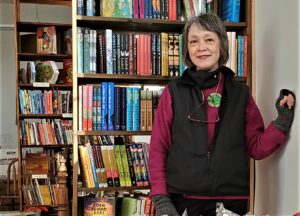
Amy Hall, Hudson Valley Books for Humanity Ossining (hvbooksforhumanity.com)
Hieroglyphic Stairway, by Drew Dillinger. I frequently read the first few stanzas aloud at the end of my public presentations on sustainable apparel. It is a riveting reminder of our responsibility toward the planet and the future generations of humanity.
Sleeping in the Forest, by Mary Oliver. Reminds me of what it’s like to spend luxurious time in the forest or even sitting on the back lawn, simply listening, watching, feeling and smelling nature all around me.
Only Breath, by Rumi. Reflects on our shared humanity, apart from how we identify or label ourselves. If only …
This short poem (is it even a poem?) by the philosopher Lao Tzu is always on my mind: A journey of a thousand miles begins with a single step. I often use it to remind people that, in order to achieve any goal, we must simply start. Don’t be daunted or overwhelmed by enormous tasks.
And then there’s Shel Silverstein’s The Voice, which simply reminds us to listen to ourselves – and to each other – for the truth. We each know what’s right, if we really listen.
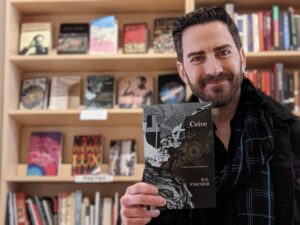
Chris Steib, Transom Bookshop, Tarrytown (transombookshop.com)
Ceive, by B.K. Fischer. From Westchester’s poet laureate, Ceive (a finalist for the 2021 NBCC Award) is a unique, deft retelling of the Noah’s Ark myth in a novella-in-verse. Like the quarantine days during which it was published, Fischer’s collection manages expertly to be both disorienting and immediate, uncanny and familiar.
Deaf Republic, by Ilya Kaminsky. Set during political unrest in an unnamed occupied territory, Kaminsky’s vital poems confront our collective silence in the face of humanitarian crises. Being hearing impaired himself, Kaminsky employs sound and its absence to accentuate the impact of the atrocities in his poems. “What is a man?” he posits. “A quiet between two bombardments.”
The Maverick Room, by Thomas Sayers Ellis.The DC-born poet and photographer turns a grainy camera toward the oft-ignored streets of our nation’s capital, giving voice to a bombastic cast of characters in stark contrast to the District’s political facade. Reminiscent of Derek Walcott and Kevin Young, Ellis tackles race, identity, and economic imbalance with skill and swagger.
View with a Grain of Sand, by Wisława Szymborska (translated by Stanislaw Baranczak and Clare Cavanagh).
Ironic but not bitter; witty but not shallow; candid but not confessional – these incredibly rare achievements in poetry are on full display in View with a Grain of Sand, in which Szymborska’s deceptively simple poems unfold in volumes. “Forgive me, distant wars” – she writes, timelessly – “for bringing flowers home.”
New and Selected Poems by Thomas Lux. When people tell me they “don’t get” poetry, I give them Billy Collins. And when they come back for more, I give them Thomas Lux. He’s approachable but piercingly clever, like that garrulous friend-of-a-friend you’re always happy to see, who’s humor is sharp but harmless, and whose anecdotes (however unbelievable) are always entertaining.
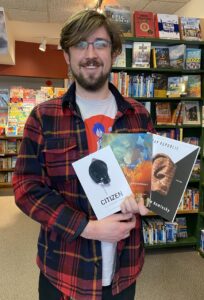
Cameron Demaree, The Village Bookstore, Pleasantville (thevillagebookstore.net)
Great Exodus, Great Wall, Great Party, by Chessy Normile. Winner of The American Poetry Review/Honickman First Book Prize in 2020, this book conveys depth and insight while bringing levity and humor to dark situations. Easily the best book of poetry I have read in many years.
You and Three Others are Approaching a Lake, by Anna Moschovakis. Part meditation, part exploration, Moshovakis details what happens as you and three others approach a lake. Drawing on personal insights as well as historical figures, particularly Alan Turing, Moshovakis probes logic, morality, nature, and our interactions with the three ultimately exploring what it is to be human.
Citizen, by Claudia Rankine. Rankine stands as one of the greatest poets of our time. This lyric discussion of race and identity further reveals the inequality in our nation. Using sports as a prime example, in addition to others, Rankine shows how white people continue to reinforce, both actively and passively, harmful stereotypes that should have been shed long ago.
Deaf Republic, by Ilya Kaminsky. This collection tells the story of a town marred by crisis, a young boy killed by the police at a protest, and the subsequent silence that befalls the town as they use sign language to attempt to communicate dissent. A moving portrait of where the world was in 2019, and all the more poignant now.
The Octopus Museum, by Brenda Shaughnessy. Shaughnessy imagines a world overrun by octopi. Each poem is the text on a plaque next to a human artifact that the octopi have found and placed in their octopus museum. A profound collection stepping outside of the human mindset to give clear understanding to the world we live in today through the eyes of something we cannot truly understand.
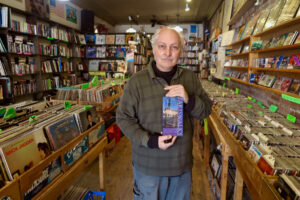
Andrew Acciaro, Bruised Apple Books and Music, Peekskill (bruisedapplebooks.com)
Shelley, by Galway Kinnell. A poem about the loss of an ideal as age tamps down the wild passion’s flame and makes heroes less in our eyes. We come to see the great admired figures we followed, flawed, human and responsible for the pain, waste and devastation in their reckless wake.
The Fire On The Hills, by Robinson Jeffers. A poem from sky burial view from the beyond good and evil perspective of forces of Nature…the original gods of Earth Sky Sea and Air. A poem about the place where destruction and creation is a process without judgment and in possession of an inhuman mercy greater than understanding allows.
The Old Men Admiring Themselves In The Water, by William Butler Yeats. A poem about shadowy beauty rippling in the reflective waters of relentless change. Of yammering age with its generation as no wiser than rocks splashed and worn away lusty for another day in the sun.
Ducks bobbing on the water, by Kobayashi Issa. A poem about the hapless unity of desire without prize. …of the moment as witnessed irretrievable pleasure to be enjoyed in the open ache of its comical forgetfulness.
Poppies In October, by Sylvia Plath
A compassionately vicious poem
a wound unboxed and rolled out
beneath gorgeous darkening skies
ignited by an audience of flowers spread free and wild
to breathe the exhausted reason for life
and question the cry emerging from their frozen human-like mouths.
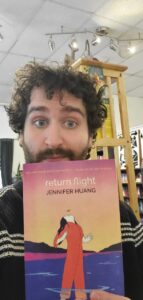
Andy DeRado, By-the-Dam Books, Croton-on-Hudson (facebook.com/bythedambooks)
Night Sky With Exit Wounds, by Ocean Vuong. As a fellow graduate of NYU’s master’s program, I picked this up while teaching at NYU. It’s a remarkable collection that feels honest and dedicated.
Dream Songs, by John Berryman. This cycle of poems feels like a classic you may have missed or some secret form of poetry long overlooked.
There Are More Beautiful Things Than Beyonce by Morgan Parker. These are sharp and engaging, with enough variation to keep you coming back over and over again.
Return Flights, by Jennifer Huang. This is the first new collection of poetry I’ve read in a long time and these really do make you feel like you are, for a moment, floating.
Such Color, by Tracy K Smith. Smith is, to me, an essential poet to read if you haven’t already, and this collection is proof.




